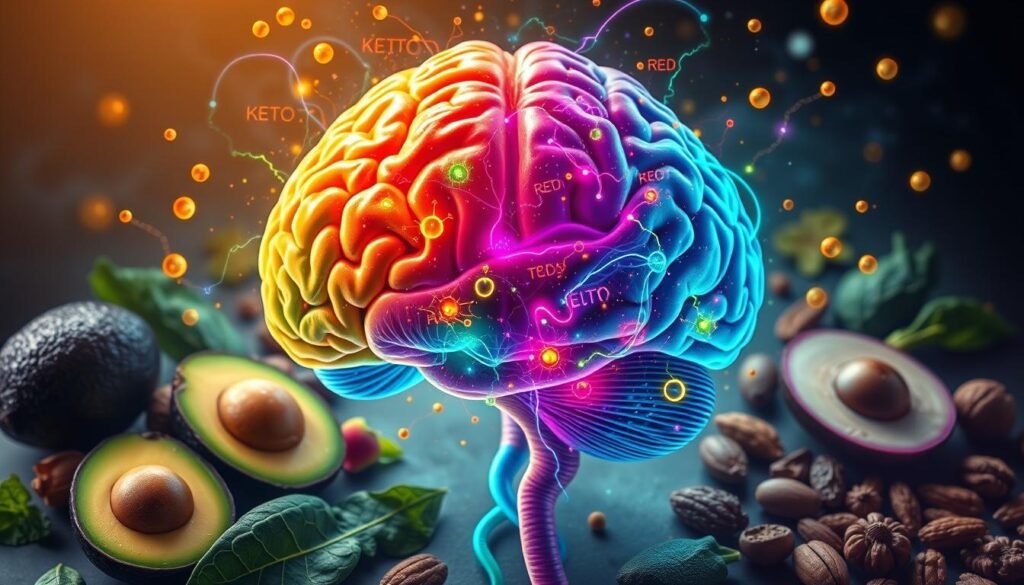A staggering 87.8% of Americans struggle with their metabolic health. This has led many to explore alternative mental health treatments, like the keto diet’s effect on depression. The keto diet, first used in 1921 for epilepsy, is now examined for its impact on mental well-being. There’s growing evidence that this low-carb diet can majorly benefit those with neurological issues, including Alzheimer’s and Parkinson’s disease.
The keto diet does more than just help you lose weight and boost your energy. Studies show it can increase GABA levels and balance your brain chemistry. It might even lessen inflammation that’s associated with depression. Considering only 12.2% of Americans are in top metabolic shape, a natural mental health approach is more important than ever.
This article explores the keto diet and mental health connection. It shows how changing what you eat could help fight depression and mood disorders.
Key Takeaways
- The ketogenic diet was originally developed to treat epilepsy in children.
- It shows promise in improving depression scores in patients with certain neurological conditions.
- Keto may help regulate insulin levels, contributing to its antidepressant effects.
- Low-glycemic nature of the diet may reduce chronic inflammation in the brain.
- Consulting healthcare professionals before starting a keto diet is essential, especially for those with existing health issues.
- Personalized approaches to keto may benefit those with complex psychiatric comorbidities.
Understanding the Keto Diet
The ketogenic diet is gaining popularity because of its health benefits, including its impact on mental health. This diet focuses on high fat, moderate protein, and very low carbs. When you eat much less carbs, your body enters a state called ketosis. Here, it burns fat for energy instead of carbs. This change can lead to positive effects beyond just losing weight. It makes the diet an interesting choice for those looking at ways to improve their mood.
What Is the Ketogenic Diet?
The ketogenic diet started in the 1920s as a way to treat epilepsy. Now, it’s a popular choice for many. People on a keto diet eat a lot of fats. This makes the body burn fats as its main energy source. Eating fewer carbs can boost energy levels, make your thinking clearer, and improve your health. More and more, people choose low-carb diets like keto not just to lose weight but to better their mental health and mood.
Macronutrient Composition of Keto
To understand the ketogenic diet, it’s important to know about the nutrients it includes. Typically, the diet is made up of:
- High Fat: About 70-75% of total calories come from fats, like avocados, nuts, seeds, and olive oil.
- Moderate Protein: Around 20-25% of calories come from proteins found in meat, dairy, and legumes.
- Very Low Carbohydrates: Carbs are only about 5-10% of the diet, with a focus on non-starchy vegetables and some dairy.
This mix of nutrients helps your body get into ketosis. This can positively affect your mood and thinking. The ketogenic diet, with its emphasis on fats, could be a way to both improve your mental and physical health.
The Relationship Between Diet and Mental Health
Recently, the link between diet and mood has gotten a lot of focus. What we eat directly changes how we feel emotionally. This shows why choosing the right foods is crucial. The way diet affects depression is especially strong. What we eat helps make neurotransmitters, crucial for controlling our emotions. Changes in how we feel can often come from what we eat, underlining nutrition’s key role in mental health.
How Nutrition Influences Mood
Eating a balanced diet makes mental health better. Certain nutrients are vital for making neurotransmitters. For example, omega-3 fatty acids in fish help with mood. Meanwhile, interest is growing around low-carb diets and mood. Some studies say ketogenic diets could lessen anxiety and stress symptoms. Focusing on whole foods full of vitamins, minerals, and healthy fats helps emotional balance.
The Impact of Diet on Depression
Studies show a strong link between diet and depression. Not getting enough nutrients can make depression worse. But, eating well has been seen to lessen depression’s impact. People eating a structured diet, like ketogenic, often feel mentally better. Looking back at patients on a whole-foods ketogenic diet, big improvements were seen. Most noticed weight loss, better health markers, and fewer psychiatric meds. This supports nutrition’s big role in tackling mental health issues.

| Study Findings | Results |
|---|---|
| Patients on Ketogenic Diet | Significant improvements in mental health |
| Clinical Remission Achieved | 43% of patients |
| Weight Loss | 96% of patients on antipsychotic medication saw weight loss |
| Improvements in Metabolic Health | Enhanced blood pressure, blood glucose, and triglycerides |
| Reduction in Psychiatric Medication | 64% were discharged on less medication |
Keto and Depression: Exploring the Connection
The ketogenic diet’s link to mental health is getting more focus from researchers. Many people on a keto diet report feeling happier and less depressed. This section looks into the recent research on ketogenic diet and how it might affect mental health.
Research Findings on Keto and Mental Health
Clinical studies show keto can really help people improve mentally. A big study found a 43% clinical remission rate for serious mental illnesses in a hospital setting when patients followed a keto diet. Plus, 64% of these patients ended up needing less medication. These results highlight keto’s potential benefits for mental wellness.
Mechanisms Behind Keto’s Impact on Depression
The ways keto helps mental health are complex but effective. One key element is GABA, a brain chemical that increases with keto and may help lessen depression. The diet also supports the growth of new brain cells, important for good emotional and mental health. People, including those with Type 2 Diabetes, feel more energetic and less hungry after being on a low-carb diet for a while.
Studies suggest keto may change brain chemistry, boosting self-esteem and a sense of purpose. Rats on a keto diet were more active, linking the diet to potential depression improvements. Keto’s anti-inflammatory effects also play a role by fighting chronic inflammation, often linked to depression and other health issues.

| Study Type | Findings |
|---|---|
| Clinical Setting | 43% remission rate in serious mental illness |
| Medication Reduction | 64% discharged on less medication |
| Well-Being Study | Improvements in mood and reduced sugar cravings |
| Long-Term T2D Participants | Enhanced energy, confidence, and resilience |
| Neurogenesis Research | Increase in new brain cells linked to emotional health |
This info shows just how versatile the keto diet is for mental health. It touches on the complex relationship between what we eat, how we feel, and our overall life quality.
Physiological Effects of the Ketogenic Diet
The ketogenic diet leads to big changes in our bodies, especially the brain. By eating low-carb and high-fat, our bodies make ketones. These ketones help control our mood and feelings. Learning about these changes shows us how the diet might help our mental health.
How Keto Alters Brain Chemistry
When you start a keto diet, your body changes how it gets energy. Normally, the brain uses glucose from carbs. On keto, it starts using ketone bodies instead. This switch is not only more efficient but also changes brain chemicals.
Studies show this can lead to better mood control. This happens because of higher ketone bodies serotonin levels. This could make you feel more emotionally stable.
The Role of Ketone Bodies in Emotion Regulation
Ketone bodies change how the central nervous system works. They affect how neurons talk to each other. This leads to more gamma-aminobutyric acid (GABA), a chemical that helps control mood.
More GABA means less anxiety and more relaxation. This is why some people feel calmer and happier on the keto diet.

The link between the keto diet and brain chemistry offers insights. It shows how what we eat affects our mental health. Understanding this can help people find ways to feel better emotionally.
Benefits of Nutritional Ketosis for Mental Health
Nutritional ketosis is gaining popularity for boosting mental health. It makes the body burn fat for energy. This can lead to emotional benefits. It helps with weight loss and supports mental health. This is through controlling insulin and helping neurotransmitters like GABA.
Regulating Insulin and Its Impact on Mood
Insulin affects our mood, so diet is essential for mental health. The keto diet keeps blood sugar levels even. This stops mood swings and irritability. So, nutritional ketosis can improve our mood and lower depression.
Increasing GABA Levels to Combat Anxiety
The keto diet raises GABA, which helps with GABA anxiety improvement. GABA is a neurotransmitter that helps us relax and lowers stress. This is key for handling anxiety. More GABA means less anxiety and more calmness. This makes the keto diet good for tackling anxiety naturally.
Improving Mitochondrial Function
The keto diet boosts energy and mental sharpness by enhancing mitochondria. This helps brain cells make energy, good for fighting mental tiredness. Better mitochondria function means more focus and better thinking. Nutritional ketosis is great for mental health, promoting emotional wellbeing.
| Key Benefits | Description |
|---|---|
| Insulin Regulation | Maintains stable blood sugar levels to prevent mood swings |
| Increased GABA Levels | Aids in relaxation and reduces anxiety symptoms |
| Improved Mitochondrial Function | Enhances energy production for better cognitive performance |
Current research shows the keto diet’s potential mental health benefits. It may help those facing mental health challenges. As a diet-based approach, it offers advantages beyond food changes. For more details on the keto diet and mental health, see recent studies.
Initial Challenges: Keto and Mood Swings
When you start a keto diet, you might face several challenges. These can influence your mind and body. The “keto flu” is common and brings fatigue, headaches, and mood changes. Such side effects can be tough as your body gets used to eating differently. Feeling moody or sad at this time is often due to eating fewer carbs.
The Keto Flu and Its Psychological Effects
The keto flu happens when your body starts to burn fat instead of carbs. This change can make your emotions swing. But, it’s usually just for a short time. Seeing these signs as normal can ease your worry.
Nutritional Deficiencies and Mood Disorders
At the start of a keto diet, not getting enough nutrients can also affect your mood. If you limit foods too much, you might miss out on important nutrients for your brain. Watch out for these:
- Magnesium: It’s key for controlling mood and might lessen anxiety.
- Omega-3 Fatty Acids: They’re needed to make mood-related chemicals in your brain.
- B Vitamins: Vital for making energy and brain chemicals.
- Electrolytes: Their levels can drop and affect your mood.
Making sure you eat well helps your mental health and softens keto’s early effects.
| Nutrient | Role in Mental Health | Sources |
|---|---|---|
| Magnesium | Regulates mood and reduces anxiety | Leafy greens, nuts, seeds |
| Omega-3 Fatty Acids | Essential for neurotransmitter production | Fatty fish, flaxseeds, walnuts |
| B Vitamins | Key for energy and neurotransmitter synthesis | Whole grains, eggs, dairy products |
| Electrolytes | Maintain fluid balance and affect mood | Vegetables, nuts, and salt substitutes |
Dealing with these issues early on helps balance your keto experience. Knowing about keto flu effects and the role of nutrients supports healthier diet choices.
Strategies for Implementing a Keto Diet
Starting a keto diet can greatly improve mental health and mood. To succeed, one should plan balanced keto meals. This ensures you get all your nutrients while sticking to the diet’s low-carb, high-fat rules. Eating different foods keeps your energy up and supports your health.
Creating a Balanced Keto Meal Plan
Balancing a keto meal plan starts with knowing your macros. Usually, the diet is 70% fat, 20% protein, and 10% carbs. Focus on healthy fats, proteins, and veggies to keep your energy and nutrients balanced. Here are some foods to include:
- Fats: Avocados, olive oil, coconut oil, and nuts.
- Proteins: Grass-fed meats, poultry, fatty fish, and eggs.
- Vegetables: Leafy greens, broccoli, zucchini, and cauliflower.
Varying your meals within the keto guidelines prevents boredom and ensures you get important nutrients. Prepping meals ahead can help busy people find quick, healthy meals.
Consulting with Healthcare Professionals
Before changing your diet, talking to a healthcare professional is key. Dietitians or nutritionists can offer tailored advice, making sure your plan matches your health goals. They might recommend blood tests to see how your body adjusts and check how the diet affects your medication. Checking in regularly helps deal with any issues, like mood changes or energy dips.
Staying in touch with your healthcare team makes sure your keto journey is safe and meets your needs. It also helps address mental health concerns. For more on how diet affects mood, check out these nutrition tips.
Additional Research on Keto and Mental Health
Recent studies highlight the ketogenic diet’s mental health benefits. They focus on how diet changes can help psychological disorders. This connects to metabolic therapy. Both clinical studies and early research show health improvements. This makes the future of mental health treatments look hopeful.
Clinical Studies Supporting Ketogenic Dietary Approaches
A Stanford Medicine trial had striking results on the keto diet’s effectiveness. At first, 29% of participants had metabolic syndrome. But, after four months on keto, none met the syndrome’s criteria. They also lost 10% weight and reduced waist size by 11%.
They saw better blood pressure, body mass index, triglycerides, blood sugar, and insulin resistance. Only one participant didn’t stick to the diet. Most felt more energetic, slept better, mood improved, and life quality went up.
Emerging Research on Metabolic Therapy for Depression
Research shows the keto diet might boost mental health by improving mitochondrial function, lowering inflammation, and boosting antioxidant activity. These are vital since mitochondrial problems often tie to depression. High-sugar diets increase insulin resistance and depression risk.
The keto diet, first for epilepsy, now shows benefits for mood and energy. It seems to help sleep quality. About 75% of those on keto noted mental health improvements. This was according to the clinical global impressions scale.
| Study Duration | Participants with Metabolic Syndrome | Participants Adherence | Average Weight Loss | Mood Improvement |
|---|---|---|---|---|
| 4 months | 29% (initially) | 14 fully adherent, 6 semi-adherent, 1 non-adherent | 10% | 75% clinically meaningful improvement |
This collection of clinical studies keto mental health supports the idea that diets, especially the ketogenic diet, could vastly help those with depression and mood disorders.
Patient Experiences and Case Studies
Many people have found the ketogenic diet helps with depression. It has shown promise for those with tough mental health issues. For example, a study with over 30 people found better mood and less anxiety with this diet. These stories show how changing what you eat might help with hard-to-treat depression.
Real-Life Case Studies on Keto Improving Depression
A few case studies really stand out. One person even got better from depression and Type II diabetes with keto. Others with bipolar disorder saw their depression go away with a keto diet plan. These stories highlight how flexible the keto diet is.
Testimonials from Individuals Following a Keto Diet
People have shared how the keto diet changed their lives. One person felt much less anxious just weeks after starting. They said it made their life and feelings so much better. Stories like this suggest keto isn’t just about physical health. It also offers hope for overcoming mental health struggles. Check out a detailed case study on keto and mental health here.